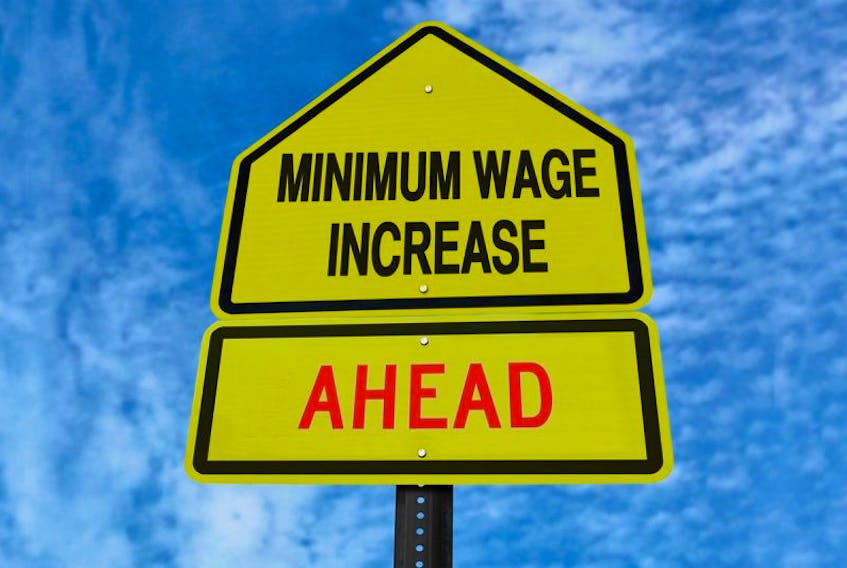Recently, there were two opinion pieces in The Telegram (Brian Jones’ column “Minimum wage announcement falls far short,” Feb. 23; and the editorial “The wage illusion,” Feb. 24) that piqued my interest. Both pieces were critical of the provincial government’s announcement to raise the minimum wage based on national inflation in the future.
The articles highlighted important points about the plight of low-income and minimum-wage earners in Newfoundland and Labrador. The Telegram editorial asked: “what mechanism will allow minimum wage earners to keep up with the rises in costs that are strictly provincial?”
The answer lies in the Low Income Tax Reduction program. In fiscal year 2017-18, this program will cost $12.5 million, of a total cost of $271 million to be spent on poverty reduction initiatives in the province. Based on a 40-hour week, increasing the income threshold of the program to the annual wage of a minimum-wage worker would mean an extra $1,100 for a number of them at an additional cost of $2 million to government. After this increase, the income thresholds would continue to be tied to provincial inflation. Through this initiative, low-income workers would keep more of their income to help deal with the increased cost of living, including potentially doubled electrical rates in 2021.
However, what The Telegram pieces failed to recognize are the current challenges of running a business in the province. Small business owners are trying to operate in a stagnant economy. As the costs of doing business in the province continue to grow substantially, revenues have not been increasing by a commensurate amount. As a result, a number of businesses are in precarious situations.
Not only have the costs of doing business in Newfoundland and Labrador increased significantly in the last couple of years, but there are additional costs to be addressed in the future. For instance, Canadian Federation of Independent Business (CFIB) research has shown small- and medium-sized enterprises will incur a collective electricity cost of at least $180 million per year if electricity rates double in 2021. A $15 per hour minimum wage by 2021 would effectively represent a 35 per cent increase in two years. If this occurs, as some suggest it should, small business owners will face some very difficult decisions, which would include where to find savings within their businesses or whether consumers will have to pay more for goods and services.
As the costs of doing business in the province continue to grow substantially, revenues have not been increasing by a commensurate amount. As a result, a number of businesses are in precarious situations.
Yet, some are arguing that the current minimum wage will result in “long-term poverty” in the province and continue to advocate for a $15 per hour minimum wage (“Predictable poverty,” letter to the editor, Feb. 27). In the last 12 years, the real (inflation-adjusted) minimum wage rate has increased by 76 per cent, whereas inflation has grown by 26 per cent. It is clear that minimum wage increases have more than kept up with the cost of living in Newfoundland and Labrador, though it is still maintained by many that minimum wage is not enough. The evidence suggests minimum wage is simply the bluntest tool in the box to address poverty.
More effective tools, including the Low Income Tax Reduction program, are available to government if it chooses to use them; for example, on-the-job training. CFIB research has shown training costs the average small business owner in Newfoundland and Labrador approximately $31,000 per year. When the funds are available, small business owners have been prepared to hire inexperienced people or youth and train them to a certain standard.
According to minimum wage data compiled by the Newfoundland and Labrador Statistics Agency, nearly 55 per cent of minimum wage earners in the province have a high school diploma or less. With the appropriate policies and programs in place, including one of the lowest tuition rates in the country, it is entirely conceivable Newfoundland and Labrador could have highly skilled workers prepared for the jobs of the future. However, formalized training is not for everyone, so it is necessary for government to broaden what it considers to be training and how it can provide the best support.
The provincial government will be under tremendous pressure to increase the minimum wage to $15 per hour. It is well-advised to tread lightly.
Vaughn Hammond
Director of provincial affairs
Canadian Federation of Independent Business — Newfoundland and Labrador









